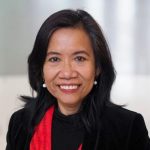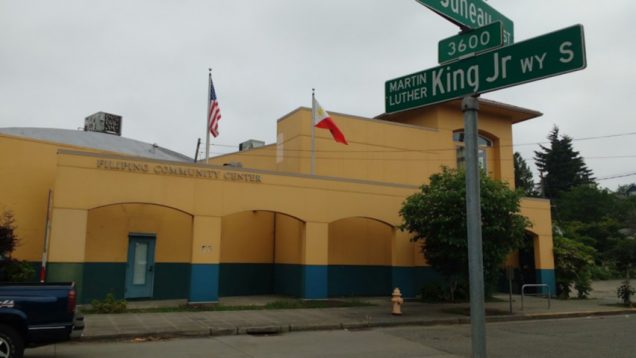Why communities need centres
Why communities need centres

By Leonora Angeles
Centre. Its many derivative words – central, centrepoint, centerfold – and phrases – centre of attention, centre of dissent – denote the point from activities, events or processes are directed, or on which they are focused.
Communities need centres if only for the necessary focus they bring to their members.
But it is not the focus itself that is important but the impact, outcomes and consequences their focus bring to the entire community and beyond.

The Filipino Community Center in Seattle, perhaps one of the oldest Fil-Am centers in the United States, is expanding to include senior housing and STEM educational training center.
(Photo: L.C. Angeles)
Whether physical, spatial, digital, or symbolic, community centres are ubiquitous and vital features in Canadian public life and civic culture. It is in and through our community centres – many with adjoining libraries and galleries – that leaders, projects and programs are born and nurtured. They are places to welcome and integrate newcomers. Places to belong, forge identities and friendships, seek help, and get support. They are so significant that cities, municipalities, townships and villages across Canada designate strategic locations as their sites, and allocate substantive portions of their budgets on their staffing, programming, and maintenance.
For many immigrant communities, their government-funded community centers need complementary sites for their cohesion, identity affirmation, and effective integration into wider Canadian society. They tend to call them cultural community centers or simply cultural centres. The word “cultural” goes beyond arts-and-culture in the creative sense. It connotes that larger purpose of affirming and celebrating ways of life, cultural expressions, and identities of various types.
Canadian cities with substantive Filipino immigrant populations, such as Toronto and Winnipeg, earlier generations of immigrants were able to acquire land and build physical centre. But in Vancouver, the metropolitan area with the second highest number of Filipino Canadian reside, three earlier attempts since the 1980s to build a community cultural centre did not succeed. The building housing the Multicultural Helping House Society is technically an immigrant settlement organization serving various ethno-cultural groups, not a community cultural centre.
The saga of building a community centre can be a long tortuous journey. In Vancouver, this saga continues and recently resurrected through community efforts around the “Elmore for Cabinet” Campaign in early November 2020. The Campaign has morphed into “Beyond Political Representation” community education and advocacy effots.
Mable Elmore, a long-time union leader and community activist, became MLA for Kensington riding under the NDP since 2009. Leading up to the BC Provincial Government’s new Cabinet announcement in early November, Filipino organizations mobilized individual and organizational signatures on an open petition letter for Premier John Horgan to appoint Mable to the new Cabinet. In just five days, the “Elmore for Cabinet” was born with more than two thousand individuals and sixty organizations signing the petition.
The ensuing political snub was even more mockingly biting, as the local newspaper coverage called it — an “affront,” a “slap in the face” — when other novice legislators bypassed Mable for a coveted cabinet position. True, seniority alone would not eclipse qualification in appointive cabinet positions. The petitioners however are convinced of Mable’s substantive qualifications and did not let go of their petition. Meeting almost weekly since November, they called for resources towards a Filipino community centre, Tagalog language lessons in BC High Schools, and for foreign credentials and work experience recognition. It is unfathomable for many why many immigrant health care providers are doing menial jobs when Canada needs more health workers during the pandemic.
According to online sources, across Canada, only 9 Filipino-Canadians have been elected to Provincial Legislatures, compared to 86 Indian-Canadians, 49 Chinese-Canadians, 27 Lebanese-Canadians, 16 Jamaican-Canadians, and 12 Pakistani-Canadians. Only one Filipino-Canadian has been elected to the federal Parliament (Rey Pagtakhan) and another appointed to the Canadian Senate (Tobias Enverga). We have lost these two federal leaders; the former to retirement, the latter to cancer.
It is no surprise how and why Filipino Canadians have little voice on policies affecting our communities across Canada.
The problem is not only institutional nor structural; it is systemic.
In Vancouver and other cities in the Lower Mainland, it is harder to get non-Anglo names elected into local government office with at-large, not ward, governance structure. The proverbial glass ceiling at the provincial and federal systems are just as hard, if not harder, to break by racialized immigrants with little resources, no name recognition, weak networks, and poor political organizing skills.
Ironic as it may seem, Mable has become unwittingly a symbolic figure for Filipino-Canadians’ long-standing perceptions of their “underappreciated” and “undervalued” labour in Canada. Mable Elmore — the second openly lesbian woman in parliament, a darling to BIMPOC, Filipinx and LGBTQ+ communities — well represented the NDP with her long history of social justice work. For Filipinos in BC, with more than 70% voting NDP in BC, Mable’s plight in the BC Parliament became emblematic of the broader Filipino saga in Multicultural Canada.
Filipinos are Canada’s third largest and fastest growing visible immigrant community. Tagalog, Visayan and Ilocano languages are widely spoken in BC municipalities. It is a major growing immigrant group with no physical cultural centre in BC. No major Philippine languages are taught in BC high schools, colleges, and universities. It has little to no visible heritage and historical landmarks despite Filipino men’s early historical encounters and intermarriages with the Nootka-Tlingit First Nations since the 1790s, and on Bowen Island in the 1880s. Historians consider Filipinos as the “first Asian group” to reach Turtle Island via the Manila-Acapulco Galleon Trade since the 1570s. (Turtle Island is the name Indigenous Peoples give to the continent we call North America.)
The systemic historical neglect, socio-economic and political marginalization of Filipino-Canadians in BC and across Canada need institutional and cultural redress.
Officers, stewards, and supporters of the National Pilipino Canadian Cultural Centre (NPC3), created in 2019, have stressed the need for a centre with physical and digital spaces for community building and empowerment. They have been lobbying BC MLAs, offering online and “open air” programs, and quietly contributing to building Filipino-Canadians civic capacity, and inter-cultural literacy of Canadians at large. NPC3’s dream is to support Filipino communities across Canada to build our youth leadership, entrepreneurial and educational capacities through Centres of various forms and sizes.
But a Centre is only the beginning of the long, arduous, often excruciating, tasks in community-building.
Centres – physical and digital – are spaces enabling identity formation, heritage retention, and civic capacity building. They are essential to valuing diversity as real resource and asset in our cities. They can be major historical landmarks, tourist destinations, critical-creative spaces, places where plans, projects, programs and other ideas percolate and persist. They can be places where future Canadian leaders are born and nurtured from the ranks of Filipinos and other immigrant communities. These Centres are critical in creating empowering models of change and solutions to old, new and emergent challenges in trust building, housing, health, employment, job creation, recreation, and climate action.
Canadian political institutions and leaders are already building their own capacities and competencies to address the settlement and needs of immigrants from all national and ethno-cultural backgrounds. In tandem, Filipino-Canadians also need to build our own capacities and competencies for empowerment-based community development, collaborative inter-cultural work, compassionate conversations, and empathetic listening and speaking from the heart.
Community Centres are vital to building these critical capacities and competencies that will guide, inspire and strengthen our community internally and across generations.
———————————-
Leonora C. Angeles, NPC3 President and Interim CEO, is Associate Professor at the UBC School of Community & Regional Planning and The Social Justice Institute, and President of the Canadian Council on Southeast Asian Studies.
Comments (0)